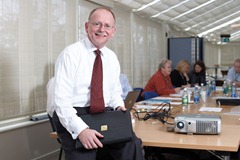Bruce Robinson interview: a changing Civil Service
The Northern Ireland Civil Service is changing. Owen McQuade met with its Head, Bruce Robinson, to discuss how the service is evolving to meet the challenges ahead.
We met in the wake of the Northern Ireland Water procurement dispute and although Bruce Robinson is unable to deal with the specifics, due to the investigation underway, he is clear as to the context for anyone working in public service.
“I’m very, very clear that the fundamental principles remain absolutely the same, which is that the civil servants are accountable to their ministers and through their ministers, in turn, to the Assembly.
“That remains a core principle.” Since devolution, Robinson says that civil servants have provided “vital support to ministers and to the Programme for Government right from the beginning.”
“That’s very, very important to all of us in the NICS: that devolution works. I always find it difficult when we go through a series of events such as we’ve gone through because for something in the order of 26-27,000 people who are committed to all of this work, much of that work goes on delivering vital services on a daily basis and to a high standard,” he adds.
Looking towards the challenges of the impending Comprehensive Spending Review (CSR), Robinson sees difficult times ahead. He expects a “very significant reduction in resources” going forward over the next four years, a trend which has already been signalled both through the emergency Budget and announcements and discussions across the water, “with very significant changes in reductions to budgets, re-examination of the various arm’s length bodies and bodies which are undertaking work on behalf of departments.”
A key element of public sector reform is the development of the channels of engagement with citizens i.e. how members of the public get in touch with government. Robinson emphasises that “a lot of work” has been done on efficiency of the different channels.
He still believes there will always be a requirement for a proportion of services to be delivered face-to-face, adding: “That’s probably the difference between government and business. I don’t think government can concentrate, just given the nature of the services it’s required to deliver, that it can simply rely on delivering them all through the internet for example – even though that is, as everybody recognises, by far and away the most efficient in cost terms.”
NI Direct
Robinson believes that the work that has been done on NI Direct is “crucial” going forward for the next four or five years. Phase one of NI Direct has “worked well” with its website now extensively used. In its first year of operations there were just over a million visitors to the site and 1.7 million since it was launched in April 2009.
There has also been a significant amount achieved in telephony terms. “The standards of our telephony now are very high and, through the four anchor tenants in Phase 1 of the telephony aspect of NI Direct, we’ve received very successful outcomes,” observes Robinson. A good example recently was the billing of rates in April and May of this year which “worked exceptionally well.”
Now that NI Direct has got “good robust systems”, he expects that the next stage of development will be to move on to making transaction services on the internet more effectively and achieve even greater savings. At this point in time, a quarter of all calls are what Robinson describes as “one and done” through the use of the contact centre in NI Direct. This means that these queries are sorted out at the initial point of contact.
Initial pilot work has found that about 30 per cent would be dealt with in this fashion. In fact, 40 per cent were dealt with on the first point of contact in a pilot with the Planning Service.
Robinson sees this as “a recognition that a lot of those queries are capable of being handled quite straightforwardly. It’s quite often people who want to be pointed in the right direction or factual information that answers the query totally.”
The next phase of development will see more transactions on the internet and more services being delivered by telephony as a back-up.
Extending shared services
Robinson believes that the Civil Service shared service infrastructure offers a platform for savings: “We know their costing. They are capable of being scaled up. I’ve no doubt that over the next year that we’ll look at the feasibility of adding more organisations on because, given that the costs are absolutely sound and very, very good value, it’s an important opportunity for us to achieve a lot more, given that we’ve made the big investment.”
He points out that shared services have also led to “significant” improvements in some areas e.g. considerably faster invoice payments to small businesses. “That has been particularly important to ministers in responding to the [economic] pressure,” he adds.
The shared services have enabled improved financial management of processes. “We’re seeing money allocated being spent and financial management tightening up very, very considerably to ensure that we were able to deliver the maximum under those [shared services] programmes and that the money that had been allocated actually then was used to deliver outcomes.”
This improved financial management is due to a combination of a focus coming from ministers recognising again the financial pressures and departments responding to that challenge.
“There’s no doubt that financial management has become a much higher priority for us and we’ve achieved these better outcomes. It’s also been about training and skills within our people as well, and we’ve achieved these much better outcomes through that combination,“ he adds.
After feedback from the initial stages of shared services, the Civil Service has put a “great deal of emphasis on better communication with staff, and encouraging innovative approaches and co-operation.
“It was difficult, and a couple of years ago staff were indicating through the staff surveys that they found it difficult, but I believe we’re past the worst of that,” he comments. “People are now seeing [that] all of these systems have bedded in [and] are delivering. All of us have adapted and changed to that, and I think again that demonstrates where we’re going.”
Sickness absence rates are “going in the right direction” and the NICS is “now moving into tackling the harder issue” of long-term absence.
It is also investing heavily in training and taking a keen interest in corporate social responsibility, which follows on from a “very long and proud history” of charitable giving. While this was previously encouraged because it was “good for morale within the department”, the value is now being realised across the service e.g. through the Benevolent Fund or Business in the Community projects.
Efficiencies
The NICS has also seen a significant improvement in productivity. Over the last five years there has been a reduction in 2.7 per cent in FTE [full-time equivalent] permanent staff while the actual budgets in cash terms over that period have gone up by just over 30 per cent. Robinson observes: “The investment we’ve had in those shared services projects [has] been able to effect those efficiencies.”
Another aspect of the increased efficiency is the balance between NICS FTEs and whole public sector FTEs, where the NICS share has reduced from 14.9 per cent to 13 per cent. “That’s a combination of both NICS reductions and the growth in public expenditure, particularly with the emphasis in areas such as health and education [where] public sector employment has grown.
The contraction has also taken place in the senior Civil Service, again due to natural wastage, which allowed staff to be redeployed as new technology was introduced. Since last November the NICS has not been recruiting to the general grade. It wanted to avoid making new recruits redundant, as the budgetary pressure increased.
“We haven’t been able to define the scale; that will be in October,” he says of the forthcoming cuts. “Obviously, departments at this point in time are looking at likely impacts and starting to understand what those might mean and looking at the potential scenarios as part of the discussion for ministers to have within their departments, for ministers to have with the Finance Minister and ultimately for all that work to come together at the Executive.”
The Civil Service has been taking a strategic approach to budgets and operating costs over the last five years. This, in turn, allowed it to develop its major IT projects and gives Robinson “confidence that we can significantly re-engineer major processes and achieve successful outcomes.”
Robinson reflects: “As we move into the CSR period and certainly for NICS, the demand on departments to look very, very carefully at how we’re doing things, look very, very carefully at the reasons we’re doing things and what that does to enhance delivery to the citizen.”
Volumes for NI Direct, July 2010
1.7 million unique visitors in the last 12 months
5.5 million page impressions
High volumes and also more and more extensive use when people use the site
Around 350,000 calls every month, 4 million calls per year
95 per cent getting through and answered within a minimum standard of 20 seconds, most much more quickly
650,000 bills and letters produced
60,000 calls to 102 number
Average waiting time 3 seconds
Only 3 per cent of calls abandoned
Essential Skills campaign generated 300% increase in visits to site
Webchat Q&A on rates bills







